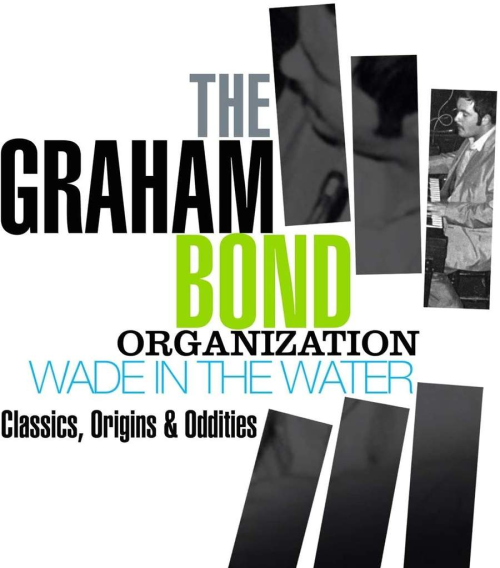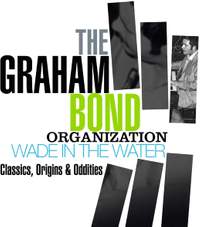Recommended New Release,
Graham Bond Organization - Wade in the Water
 Of all the British rhythm and blues bands of the sixties, none came closer to the earthy rawness of their Black American counterparts than the classic line-up of the Graham Bond Organization, featuring Graham Bond (vocals, organ, alto sax), Jack Bruce (vocals, bass and harmonica), Dick Heckstall-Smith (saxes) and the force of nature that was Ginger Baker (drums). Whilst Bond’s Hammond style was clearly influenced by the likes of Wild Bill Davis and Jimmy Smith, he added his own uniquely British punkish swagger, which suited the hoarse and somewhat aggressive style of the band's various vocalists over the years (including his own contributions). Unlike contemporaries such as The Yardbirds or John Mayal and the Bluesbreakers, the GBO never quite broke through to the mainstream, recording only two studio albums and a handful of singles in their short existence between 1963-1967, with a breif reformation between 1969-1970. Much of their time was spent on the road, where they earned a reputation as one of the most exciting live acts of the period (as can be heard on an atrociously recorded but nonetheless compelling live set from 1964 on the closing disc).
Of all the British rhythm and blues bands of the sixties, none came closer to the earthy rawness of their Black American counterparts than the classic line-up of the Graham Bond Organization, featuring Graham Bond (vocals, organ, alto sax), Jack Bruce (vocals, bass and harmonica), Dick Heckstall-Smith (saxes) and the force of nature that was Ginger Baker (drums). Whilst Bond’s Hammond style was clearly influenced by the likes of Wild Bill Davis and Jimmy Smith, he added his own uniquely British punkish swagger, which suited the hoarse and somewhat aggressive style of the band's various vocalists over the years (including his own contributions). Unlike contemporaries such as The Yardbirds or John Mayal and the Bluesbreakers, the GBO never quite broke through to the mainstream, recording only two studio albums and a handful of singles in their short existence between 1963-1967, with a breif reformation between 1969-1970. Much of their time was spent on the road, where they earned a reputation as one of the most exciting live acts of the period (as can be heard on an atrociously recorded but nonetheless compelling live set from 1964 on the closing disc).
Bond was a complex and deeply troubled man, plagued throughout his life by mental health issues, drug addiction, and towards the end an unhealthy obsession with the occult, all of which ultimately lead to what is generally thought to have been his suicide in 1974, throwing himself under a train at Finsbury Park tube station. Born in Romford, Essex in 1937, he was adopted from a Dr. Barnado’s home, and showing early promise, studied music at the Royal Liberty School in London. In 1960 he joined the Goudie Charles Quintet, before becoming saxophonist in Don Rendell Quintet, where he gained considerable attention, making it to second place in Melody Maker’s ‘New Star’ jazz poll of 1961. It was during a brief tenure with Alexis Korner’s Blues Incorporated that he first played with Ginger Baker and Jack Bruce (who later formed Cream with Eric Clapton, to far great commercial success, much to Bond's chagrin), whom he poached to form the GBO. Guitarist John McLaughlin also joined the group for a short while and is featured on a dozen tracks on the first disc. Don't get too excited though - his contributions here give few clues to his later pyrotechnics. Far more impressive is Dick Heckstall-Smith's lithe saxophone phrases, which effortlessly complement Bond's organ throughout the set.

Bond’s love of jazz, especially the music of Mingus and Monk, is most evident in the early sessions from 1963, especially where Bruce plays upright bass in a style clearly indebted to Mingus. Alongside ballsy renditions of hits of the day like The Beatles’s ‘I Saw Her Standing There’ and Ray Charles’s ‘What’d I Say’ and ‘I Got a Woman’, we get Bond’s own ‘Farewell Baby’,‘Slippin’ & Slidin’, and the haunting mid-tempo ‘Spanish’. All of these demonstrate Bond’s prodigious keyboard technique, revealing a truly thoughtful player, able to provide light and shade in his tone and attack on the Hammond, to suit the mood of the music. A standout session features originals by guitarist Ernest Ranglin, with Ranglin and Bond trading licks with a fluidity that hold up alongside similar recordings being made in the States by the likes of Grant Green and Big John Patton.
This 4-CD set from Repertoire Records offers virtually the complete recorded works of the GBO, with Pete Brown’s booklet essay painting a vivid picture of the band’s contributions to the British Rhythm and Blues scene. Most importantly, it’s the abundance of music, most of which is well recorded, that presents a compelling argument for re-evaluating this historic group. Although there are inevitable repetitions in the repertoire, it’s fascinating to hear such distinctly British takes on the staples of the rhythm and blues songbook. Bond was one of the key figures who helped to drag British jazz out of its rather cosy, buttoned-down love affair with trad jazz and into more primal territory. His influence can be heard in progressive and hard rock that followed in the late sixties, with Deep Purple’s Jon Lord saying ‘He taught me, hands on, most of what I know about the Hammond organ’.
Available Format: 4 CDs



